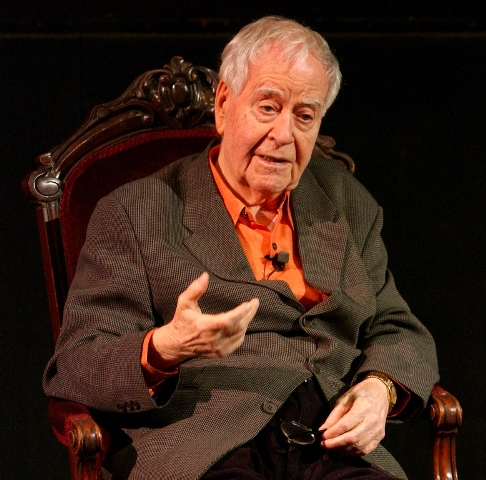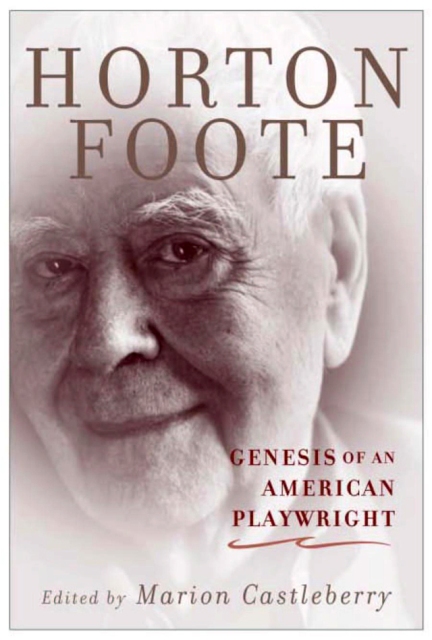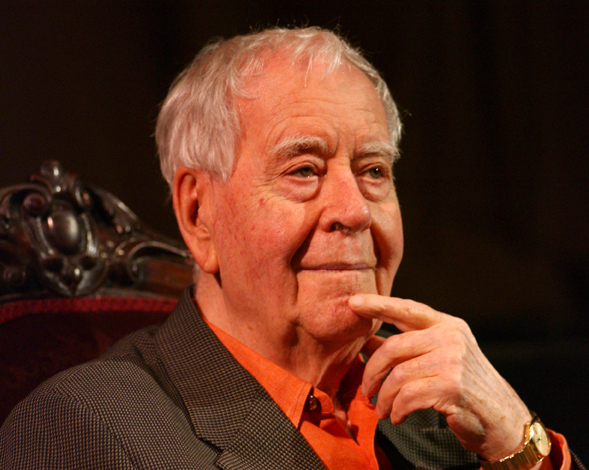Baylor Mourns Death of Horton Foote



Media contact: Lori Fogleman, director of media communications, (254) 710-6275
Baylor University is mourning the death of Horton Foote, one of America's leading playwrights and screenwriters and Baylor's Visiting Distinguished Dramatist, who died Wednesday in Hartford, Conn., at the age of 92.
In 2002, Foote graciously accepted the dramatist title at Baylor and joined the theatre arts faculty to work closely with students in sessions scheduled throughout each year.
In 2004, Baylor honored Foote again with the inaugural Horton Foote American Playwrights Festival, a semi-annual celebration of American playwriting. The festival focuses on the work of a great American playwright with performances, an academic symposium on the writer and an award that bears Foote's name. The next festival is scheduled for Nov. 5-7, 2009.
"Horton was a tremendous human being," said Dr. Marion Castleberry, professor of theater arts at Baylor and editor of Horton Foote: Genesis of an American Playwright, a compilation of essays written by Foote. The book was published in 2004 by Baylor University Press.
"In a business that doesn't always reward kindness, he remained a gentle, caring and sensitive person. We have lost a treasure," he said.
In addition, Foote gave his blessing for Baylor's department of theatre arts to form a new American Actors Company, which played a pivotal role in Foote's career. In 1938, a group of artists led by Mary Hunter and including such notables as Foote, Agnes DeMille and Jerome Robbins, created the American Actors Company to escape the commercialism of Broadway and promote artistry drawing on authentic American voices. Before disbanding in 1945, the American Actors Company had produced a number of Foote's first plays.
In 2004, the new American Actors Company produced the first professional production of the Horton Foote American Playwrights Festival, Foote's own "The Traveling Lady." The play later enjoyed an extremely successful off-Broadway run in New York in 2006, receiving a Drama Desk nomination for "Outstanding Revival of a Play."
Born in Wharton, Texas, in 1916, Foote received his first Academy Award in 1962 for his screenplay of "To Kill a Mockingbird" and his second in 1983 for "Tender Mercies." He received a Pulitzer Prize for his play "The Young Man from Atlanta."
In 1989, he was the recipient of The William Inge Award for Lifetime Achievement in the American Theater. More recent honors include a Gold Medal for Drama from the Academy of Arts and Letters, an Emmy Award for his television adaptation of William Faulkner's "The Old Man" and a Lifetime Achievement Award from the Writer's Guild of America. He also received the National Medal of Arts Award from President Bill Clinton in 2000.
Foote's affection for Baylor was long standing, Castleberry said. Foote's great-great-grandfather, Albert Clinton Horton, the first lieutenant governor of Texas, gave $5,000 to establish Baylor in 1845 and was a charter member of its board of trustees.
Foote's wife, Lillian, died in 1992. He is survived by four children: actress Hallie Foote; Horton Foote Jr., an actor/director and restaurant owner in New York; Walter Foote, a lawyer; and playwright Daisy Foote; and two grandchildren.
Baylor's theater department has a long and storied history. Founded in 1901, the department was elevated to international prominence under the direction of Paul Baker, who chaired the department from 1934-63. It was during this period that the university built its first theater building, established the Dallas Theater Center and gained national acclaim for experimental productions, including revolutionary stagings of "Hamlet" and "Othello," which featured performances by Charles Laughton and Burgess Meredith and were reviewed by The New York Times and Paris newspapers.
Alumni of the theater program include actress Carole Cook; Beau Gravitt, assistant director of the Actor's Studio in New York; Doug Rogers, part of the Oscar-winning team on the movie "Shrek"; and Chris Coleman, director of the Portland Stage Co.